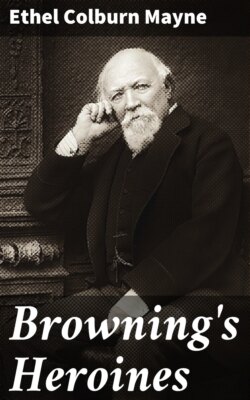Читать книгу Browning's Heroines - Ethel Colburn Mayne - Страница 9
На сайте Литреса книга снята с продажи.
Оглавление"I thought they loved me, did me grace
To please themselves; 'twas all their deed"
—and never a thought of their jealousy had entered her mind. Both were beautiful—
" … Each a queen
By virtue of her brow and breast;
Not needing to be crowned, I mean,
As I do. E'en when I was dressed,
Had either of them spoke, instead
Of glancing sideways with still head!
But no: they let me laugh and sing
My birthday-song quite through … "
and so, all trust and gaiety, she had gone down arm-in-arm with them, and taken her state on the "foolish throne," while everybody applauded her. Then had come the moment when Gauthier stalked forth; and from the older mind, now pondering on that infamy, a flash of bitter scorn darts forth—
"Count Gauthier, when he chose his post,
Chose time and place and company
To suit it … "
for with sad experience—"knowledge of the world"—to aid her, she can see that the whole must have been pre-concerted—
"And doubtlessly ere he could draw
All points to one, he must have schemed!"
* * * * *
Her trust in the swiftly emerging champion and lover is comprehensible to us of a later day—that, and the joy she feels in watching him impatiently submit to be armed. Even so might one of us watch and listen to and keep for ever in memory the stamp of the foot, the sound of the "ringing gauntlets"—reproduced as that must be for modern maids in some less heartening music! But, as the tale proceeds, we lose our sense of sisterhood; we realise that this girl belongs to a different age. When Gauthier's breast is torn open, when he is dragged to her feet to die, she knows not any shrinking nor compassion—can apprehend each word in the dialogue between slayer and slain—can, over the bleeding body, receive the avowal of his love who but now has killed his fellow-man like a dog—and, gathered to Gismond's breast, can, unmoved by all repulsion, feel herself smeared by the dripping sword that hangs beside him. … All this we women of a later day have "resigned"—and I know not if that word be the right one or the wrong; so many lessons have we conned since Gismond fought for a slandered maiden. We have learned that lies refute themselves, that "things come right in the end," that human life is sacred, that a woman's chastity may be sacred too, but is not her most inestimable possession—and, if it were, should be "able to take care of itself." Further doctrines, though not yet fully accepted, are being passionately taught: such, for example, as that Man—male Man—is the least protective of animals.
"Over my head his arm he flung
Against the world … "
I think we can see the princess, as she spoke those words, aglow and tremulous like the throbbing fingers in the Northern skies. Well, the "Northern Lights" recur, in our latitudes, at unexpected moments, at long intervals; but they do recur.
One thing vexes, yet solaces, me in this tale of Count Gismond. The Countess, telling Adela the story, has reached the crucial moment of Gauthier's insult when, choked by tears as we saw, she stops speaking. While still she struggles with her sob, she sees, at the gate, her husband with his two boys, and at once is able to go on. She finishes the tale, prays a perfunctory prayer for Gauthier; then speaks of her sons, in both of whom, adoring wife that she is, she must declare a likeness to the father—
"Our elder boy has got the clear
Great brow; tho' when his brother's black
Full eye shows scorn, it … "
With that "it" she breaks off; for Gismond has come up to talk with her and Adela. The first words we hear her speak to that loved husband are—fibbing words! The broken line is finished thus—
" … Gismond here?
And have you brought my tercel back?
I just was telling Adela
How many birds it struck since May."
We, who have temporarily lost so many things, have at least gained this one—that we should not think it necessary to tell that fib. We should say nothing of what we had been "telling Adela." And some of us, perhaps, would reject the false rhyme as well as the false words.
